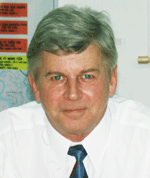Vietnam is breathtaking, don’t take it away!
Kevin Moore, the chief operation officer of Da Phuoc Integrated Waste Management Facility under VWS, talks to VIR about this project and his firm’s other ones underway in Vietnam.
 |
| Mr Kevin Moore |
Can you elaborate on Da Phuoc waste treatment project in Ho Chi Minh City? The project is built in an open tidal flat that is bounded and intersected with various navigable canals.
The site is approximately 127 hectares in area. Phase 1 of the project includes a 17 hectare process area and a landfill area of approximately 30 hectares.
This provides over 3 million cubic meters of airspace, and presently accepts 3,000 tonnes per day from Ho Chi Minh City and 20 tonnes per day from Long An.
The Facility features a design capacity of 12,000 tonnes per day. Combined with other landfill phases an estimated 20 to 25 years of capacity exist.
Capital investment during Phase 1 exceeds $100 million, while remaining phases will exceed an additional $60 million.
Currently, VWS is performing compost tests with capacity of 100 tonnes per day. After the commission, the capacity will be increased to 1,000 tonnes per day. We have completed the commissioning of our first 500 ton per day recycling sort line.
We employ 3 water treatment processes at Da Phuoc. Process 1 is a reverse-osmosis process capable of treating 280 cubic meters /day. Process 2 is a chemical dosing filtration process with a capacity of 3,000 cubic meters /day.
Process 3 which utilizes a membrane, bio-reactor is finishing installation and will treat 1,000 cubic meters /day. This technology is firstly applied in Vietnam for landfill leatchate treatment. All processes exceed applicable Vietnamese waste water discharge standards.
How do you rank the technology that is currently employed at Da Phuoc plant compared to others in South East Asia and the world?
VWS managing solid waste is Vietnam’s first privatization of waste services and a good start and leading example of how to manage waste, for others to follow.
We utilize USA EPA standards in technology selection and design. Technology also includes best management practices, engineering, operating procedures, and training.
With that, I believe VWS is the No. 1 or best operation in SE Asia. Singapore and Hong Kong have some excellent facilities as well. VWS will continue to improve and introduce new technologies and not rest upon present achievements.
What about the project recently initiated by VWS in the Mekong Delta province of Long An?
We are undertaking another waste treatment project in Long An province’s Thu Thua district. The project is now under the period of feasibility study and we expect to finish the study and master plan design by the end of next year.
The project, approved by the Government since 2002, is expected to be the solid waste treatment centre for the Key Southern Economic Zone. Once complete, the 1,760-hectare project will be able to process all the wastes from Long An, Ho Chi Minh City and other southern provinces.
As an environmental expert, what is your comment on investment and human resource attracting policies into environmental field of Vietnam?
Many areas in Vietnam have much to improve and many challenges to protect environment. Infrastructure growth and developments are implemented without the environment as the primary consideration.
However, the awareness of leaders is improving. Not much different than the environmental movement in USA during the 1960’s and 70’s. It starts with education and will take time for all peoples and leaders to put the environment first, before profit, and development.
Vietnam needs resources, experts and investment into environmental efforts. Vietnam needs to consider not just the technology, solution, or size of investment, but the continued safe operation and success with operators that take responsibility.
That is why local training is so important. Attracting the owners and operators which will put the environment first is the mission and mindset that should be foremost in policies.
Education of the people about the importance of eliminating pollution, liter control and stopping contamination is my strongest recommendation. All environmental victories are temporary, while all environmental losses are permanent.
Clear, objective anti-pollution and environmental laws and regulations are needed. Penalties for violations need to be more severe.
This must be followed by empowering Government Agencies with the authority to investigate, penalize, issue violations, and even shut down harmful activities when a company or organization is not in compliance with environmental rules.
The Environmental Protection agencies must not answer to other local or provincial agencies, thus not be subject to bad influence or conflicting interests.
What the stars mean:
★ Poor ★ ★ Promising ★★★ Good ★★★★ Very good ★★★★★ Exceptional
Related Contents
Latest News
More News
- Hermes joins Long Thanh cargo terminal development (February 04, 2026 | 15:59)
- SCG enhances production and distribution in Vietnam (February 04, 2026 | 08:00)
- UNIVACCO strengthens Asia expansion with Vietnam facility (February 03, 2026 | 08:00)
- Cai Mep Ha Port project wins approval with $1.95bn investment (February 02, 2026 | 16:17)
- Repositioning Vietnam in Asia’s manufacturing race (February 02, 2026 | 16:00)
- Manufacturing growth remains solid in early 2026 (February 02, 2026 | 15:28)
- Navigating venture capital trends across the continent (February 02, 2026 | 14:00)
- Motivations to achieve high growth (February 02, 2026 | 11:00)
- Capacity and regulations among British areas of expertise in IFCs (February 02, 2026 | 09:09)
- Transition underway in German investment across Vietnam (February 02, 2026 | 08:00)

 Tag:
Tag:

















 Mobile Version
Mobile Version